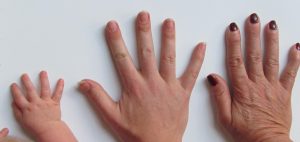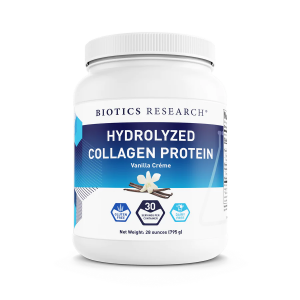We’ve had quite a few patients/clients that have been concerned about their skin, nails, and hair. Have you ever heard of Botox in a bottle? Well, that’s what some are calling hydrolyzed collagen protein. The key word is “hydrolyzed” because collagen is very difficult to digest. Hey, Dr Bob, here to tell you all about it!
Most collagen supplements are made from the connective tissue of animals, which is tough to break down. In its natural state, collagen is composed of large molecules. “Hydrolyzed” collagen is broken down into smaller molecules, called petides, for better absorption. Hydrolyzed or predigested collagen studies show it can pass through the intestine easily and be used as building blocks for repair and trigger our own internal collagen production.
Collagen loss begins between 18 and 29 years of age and by the time a person is 80 years old collagen production has slowed by 75% as compared to when we were younger.

Many signs of aging include loss of elasticity of the skin, stiff joints and muscle loss but alarmingly other signs of collagen deficiency may include excessive skin wrinkles, blood pressure problems, achy muscles, cellulite, dental problems, thinning hair and brittle nails.
There’s some debate over the absorption of powdered collagen; however, research is showing that hydrolyzed collagen peptides are well absorbed and bioavailable and studies show peptides were increased in the blood within an hour of ingestion.
Supplemental collagen works in at least 2 ways. Collagen is documented to cross the GI tract and feed repair mechanisms and secondly, collagen peptides have unique signaling characteristics that tell the body to make more collagen. Abundant research has demonstrated positive effects of collagen supplementation on skin, joint integrity and function, gut lining integrity, increased muscle mass and bone health and when it comes to bone health numerous animal studies have shown increased bone density.
A more recent human randomized, placebo-controlled trial demonstrated that supplementation with 5g of specific collagen peptides significantly increases bone mineral density of the lumbar spine and the femoral neck as well as blood levels of the bone marker, P1NP, in postmenopausal women with age-related decline in Bone Mineral Density.”
The collagen family consists of 28 different proteins, which account for 25% -35% of the total protein mass in mammals. Type I collagen is the most abundant in human skin (80%). Type I collagen is also essential for bones, tendons, ligaments, vascular ligature, and organs. Type II is predominately cartilage. Type III is also involved in skin and any tissues with elastic properties, fibrous protein, bone, cartilage, tendons, and other connective tissues.
When I first learned about collagen supplementation for our patients/clients, I was honestly just concerned about skin, meaning Type I; but the more I studied and realized collagen is necessary for blood vessels, tendons, ligaments, and organ support, I realized I wanted all three types available and that digestion was a problem with straight collagen which is why I primarily recommend hydrolyzed collagen protein which results in increased absorption. The hydrolyzed collagen protein I use has a higher nitrogen score than whey (above 100) and yields 21 grams of protein per serving and a side note, this is a protein product with high levels of collagen. Some collagen products have lower amounts of collagen and do not have protein or dissolve readily in water. Since this is a protein powder with concentrated collagen it will mix like a protein powder and dissolves with shaking or blending.

I use the vanilla flavored collagen in coffee and as a matter of fact I’ll make a video to demonstrate exactly how it’s done.
If you want to use a collagen that you’re certain is doing the job and is benefitting you on the inside and outside, just give our office a call! We’ve got what you need and we’re here to help you achieve “the best performance of your life!”
God bless,
DrB



